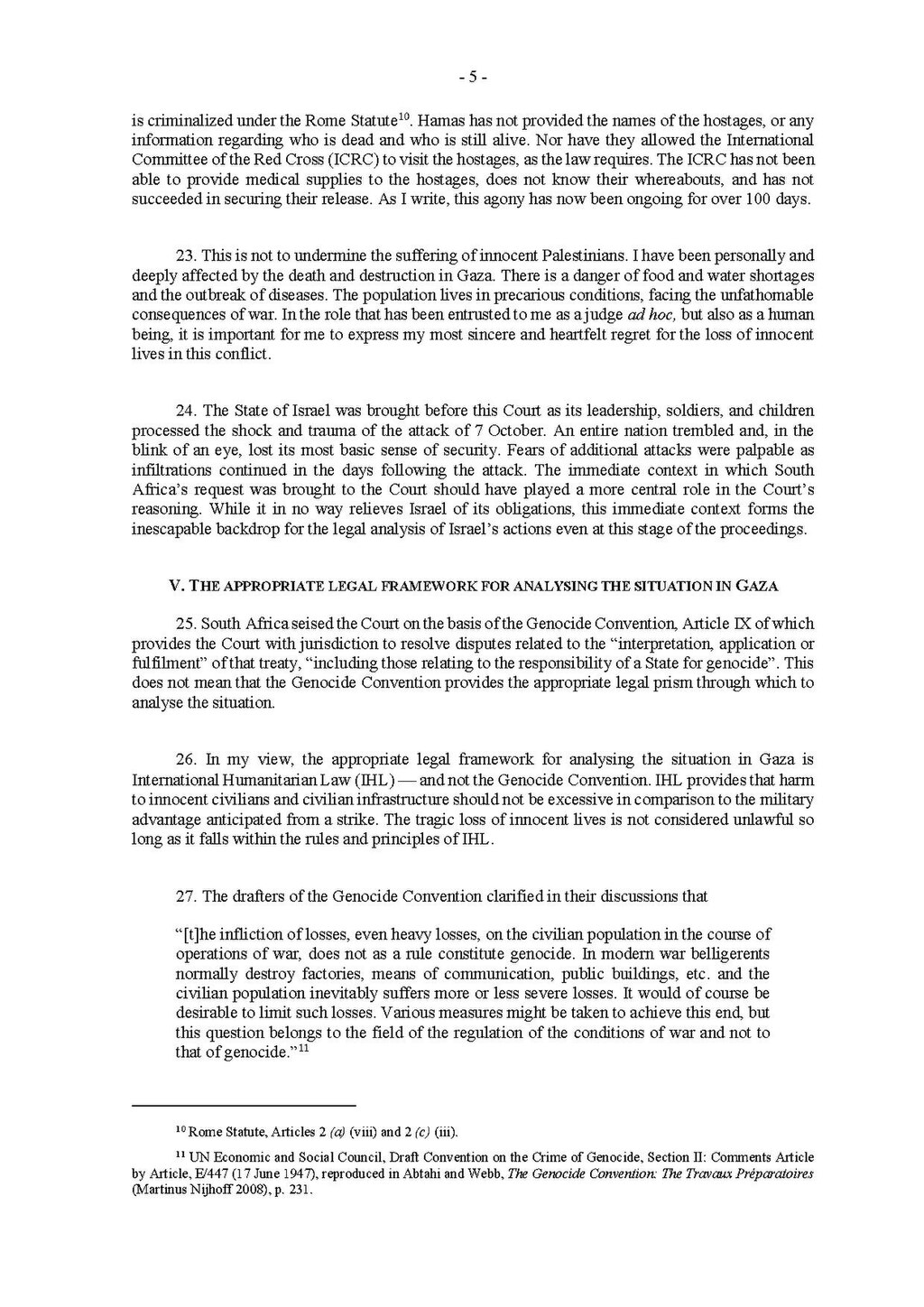- 5 -
is criminalized under the Rome Statute[1]. Hamas has not provided the names of the hostages, or any information regarding who is dead and who is still alive. Nor have they allowed the International Committee of the Red Cross (ICRC) to visit the hostages, as the law requires. The ICRC has not been able to provide medical supplies to the hostages, does not know their whereabouts, and has not succeeded in securing their release. As I write, this agony has now been ongoing for over 100 days.
23. This is not to undermine the suffering of innocent Palestinians. I have been personally and deeply affected by the death and destruction in Gaza. There is a danger of food and water shortages and the outbreak of diseases. The population lives in precarious conditions, facing the unfathomable consequences of war. In the role that has been entrusted to me as a judge ad hoc, but also as a human being, it is important for me to express my most sincere and heartfelt regret for the loss of innocent lives in this conflict.
24. The State of Israel was brought before this Court as its leadership, soldiers, and children processed the shock and trauma of the attack of 7 October. An entire nation trembled and, in the blink of an eye, lost its most basic sense of security. Fears of additional attacks were palpable as infiltrations continued in the days following the attack. The immediate context in which South Africa’s request was brought to the Court should have played a more central role in the Court’s reasoning. While it in no way relieves Israel of its obligations, this immediate context forms the inescapable backdrop for the legal analysis of Israel’s actions even at this stage of the proceedings.
V. The appropriate legal framework for analysing the situation in Gaza
25. South Africa seised the Court on the basis of the Genocide Convention, Article IX of which provides the Court with jurisdiction to resolve disputes related to the “interpretation, application or fulfilment” of that treaty, “including those relating to the responsibility of a State for genocide”. This does not mean that the Genocide Convention provides the appropriate legal prism through which to analyse the situation.
26. In my view, the appropriate legal framework for analysing the situation in Gaza is International Humanitarian Law (IHL)—and not the Genocide Convention. IHL provides that harm to innocent civilians and civilian infrastructure should not be excessive in comparison to the military advantage anticipated from a strike. The tragic loss of innocent lives is not considered unlawful so long as it falls within the rules and principles of IHL.
27. The drafters of the Genocide Convention clarified in their discussions that
“[t]he infliction of losses, even heavy losses, on the civilian population in the course of operations of war, does not as a rule constitute genocide. In modern war belligerents normally destroy factories, means of communication, public buildings, etc. and the civilian population inevitably suffers more or less severe losses. It would of course be desirable to limit such losses. Various measures might be taken to achieve this end, but this question belongs to the field of the regulation of the conditions of war and not to that of genocide.”[2]
- ↑ Rome Statute, Articles 2 (a) (viii) and 2 (c) (iii).
- ↑ UN Economic and Social Council, Draft Convention on the Crime of Genocide, Section II: Comments Article by Article, E/447 (17 June 1947), reproduced in Abtahi and Webb, The Genocide Convention: The Travaux Préparatoires (Martinus Nijhoff 2008), p. 231.

